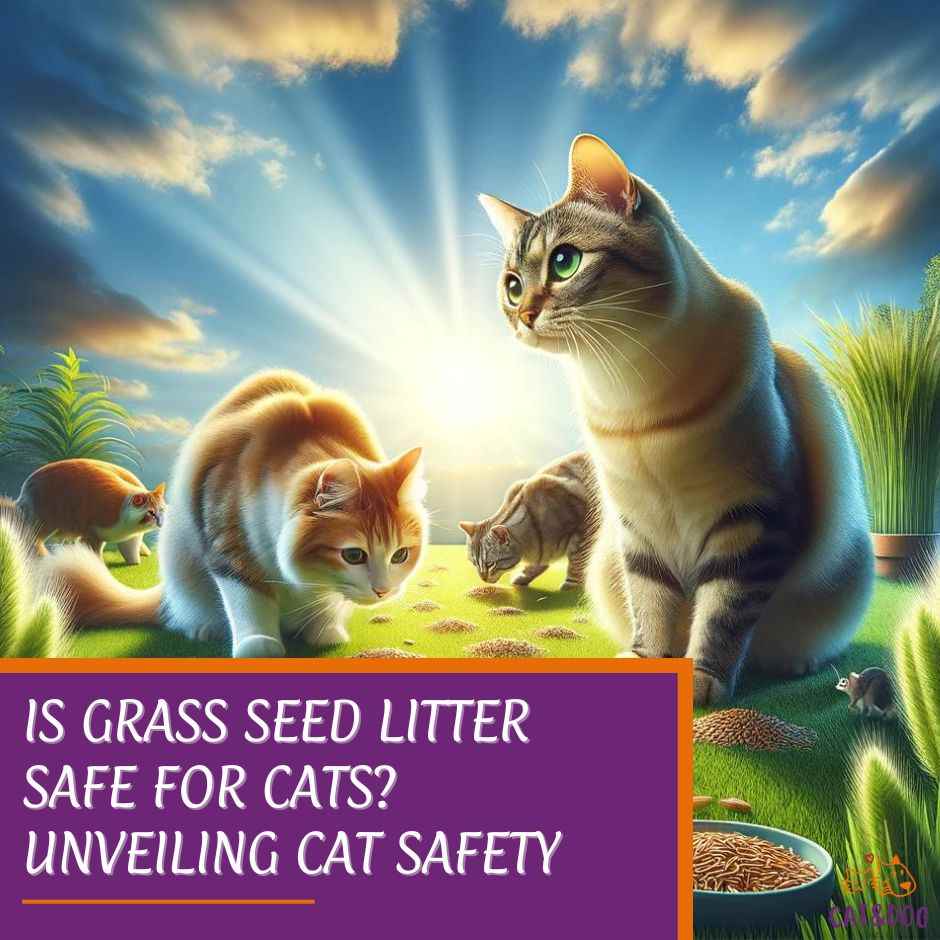If you’re a cat owner exploring new kitty litter options, you might be pondering whether grass-seed cat litter is a safe choice for your feline friend. Is grass seed litter safe for cats?
It’s a legitimate concern, given that cats are curious by nature and it’s crucial to consider anything that comes into close contact with them.
Grass seed litter is gaining popularity among environmentally conscious pet owners but assessing its safety is essential before making the switch.
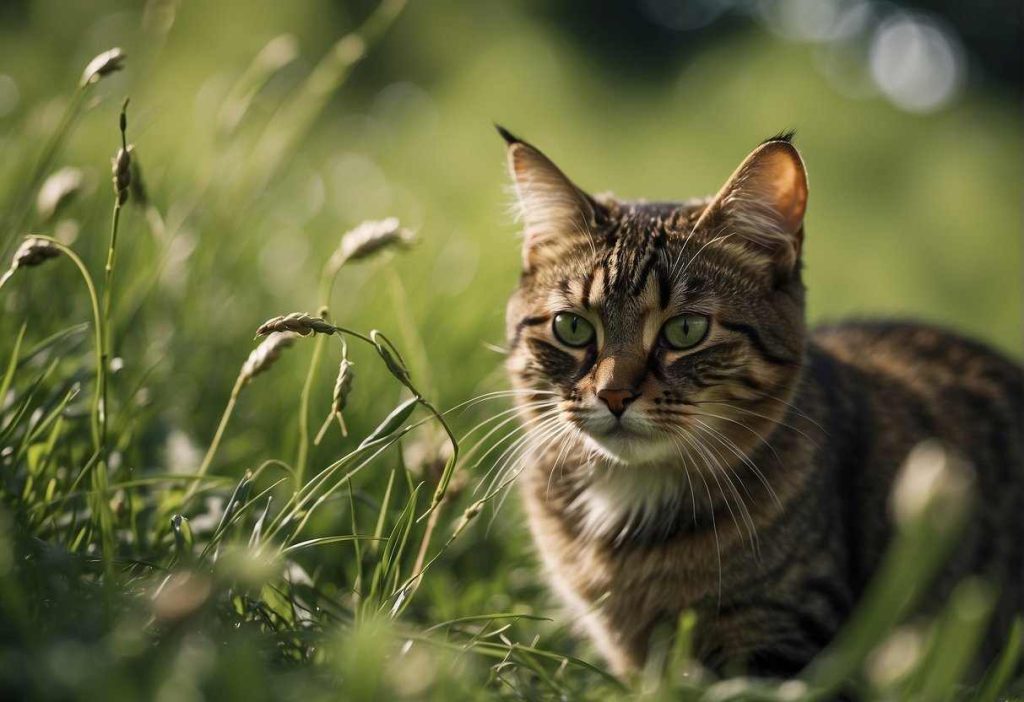
Deciding what’s best for your cat can sometimes feel like navigating a minefield with so many products on the market.
You’ll want to weigh the practical benefits—like how grass seed litter might control odor and is easy to dispose of—against potential health concerns. (1)
Cats can be sensitive creatures, and it’s necessary to consider if grass seed litter could trigger allergies or asthma. (2)
Additionally, you might be curious about the environmental impact of using this type of cat litter compared to more traditional options.
Key Takeaways
- Grass seed cat litter is a product to consider for its potential health and environmental benefits.
- Assessing its safety for your cat involves looking into possible allergies and respiratory issues.
- Understanding the economic and practical advantages can inform a cost-effective and sustainable choice.
Is Grass Seed Litter Safe for Cats? Assessing the Safety of Cats
Allergic Reactions:
Are you dealing with a sensitive sniffer at home?
- Cats can be just as sensitive as us, and some might react to grass seed litter.
- Symptoms to watch for:
Ingestion Risks:
- We know cats are curious creatures—they nibble on almost anything, including litter.
- But is grass seed litter a no-go if ingested?
- Possible concerns:
Expert Opinions:
- Dr. Whisker says, “Grass seed litter can be a natural and biodegradable option, but monitor your cat closely.”
- Dr. Claw remarks, “Most cats won’t have an issue, but always opt for dust-free varieties to minimize respiratory concerns.”
Veterinary Insights:
Once you bring that litter home, your cat’s wellness is in your hands. Here’s what to keep an eye out for according to the pros:
- Regular bowel movements
- No drastic changes in behavior or appetite
Scientific Research:
Up to date on the latest kitty litter studies? They suggest that while grass seed litter is often safe, it’s always best to:
- Introduce new litter gradually
- Ensure it’s free from harmful additives
In a nutshell, you’re the best judge of your cat’s health. Keep tabs on how your cat interacts with grass seed litter, and consult your vet if anything seems amiss.
And don’t forget: safety first means a happy, purring kitty.
Addressing Health Concerns: Allergies, Asthma, and Sensitivities
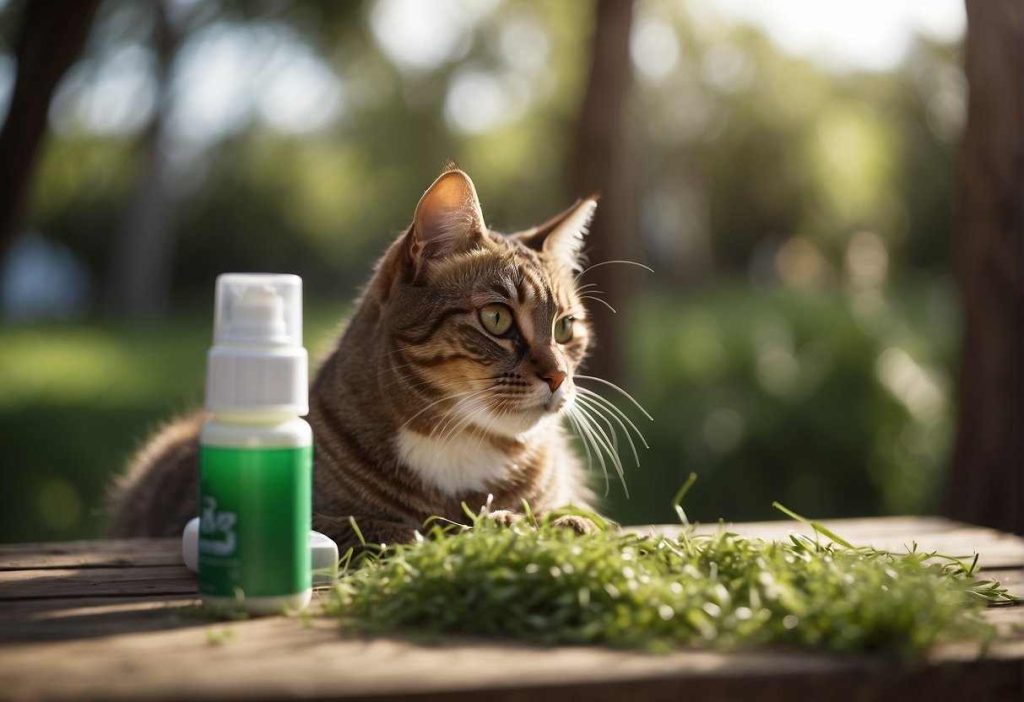
Allergies and Asthma: A Side-by-Side with Traditional Litters
- Traditional Clay Litter: Often produces dust that can exacerbate respiratory issues.
- Grass Seed Litter: Typically 99% dust-free, means cleaner air for you and your pet.
Do you have a kitty with a sensitive nose?
Grass seed litter’s low dust output could mean fewer sneezes. Here’s a quick glance at the allergenic potential:
| Litter Type | Dust Levels | Allergenic Potential |
|---|---|---|
| Traditional Litter | High | High (for sensitive cats) |
| Grass Seed Litter | Low to None | Low |
The Hypoallergenic Perks of Grass Seed Litter
Do you worry about what your cat is digging into?
If you’ve ever whisked away to the vet due to an allergy flare-up, you know how important hypoallergenic products are.
- Grass seed litter is often recommended for its hypoallergenic properties.
- Fewer chemicals mean a happier, healthier cat and a relieved you.
If your cat has known sensitivities, you might find grass seed litter to be just what the veterinarian ordered.
Remember, your cat’s health comes first, so keep an eye on how they interact with their litter and always consult with your vet about the best option for their specific health needs.
Environmental Impact of Grass Seed Cat Litter
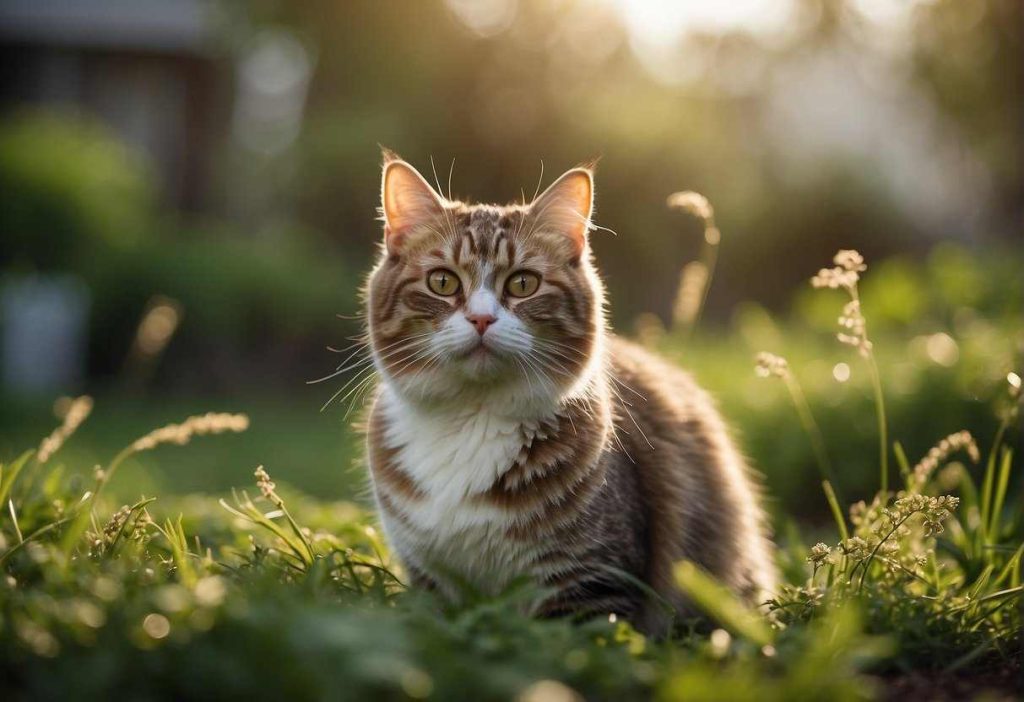
Sustainability and Biodegradability
- Did you know that grass seed litter is typically biodegradable?
- Yup, this means it breaks down more easily in the environment compared to some traditional litters. That’s definitely a point for Mother Nature!
- But just how sustainable is it?
- Generally, grass seed litter is derived from renewable resources, which curbs the depletion of our planet’s treasures.
Production Process and Environmental Footprint
- Now, here’s the scoop on its production.
- Producing grass seed litter usually demands less energy and emits fewer greenhouse gases than clay-based litters. Less energy means less fuel burned!
Comparison with Other Eco-friendly Litters
| Feature | Grass Seed Litter | Other Eco-friendly Litters |
|---|---|---|
| Biodegradability | High | Variable |
| Renewable Resources | Yes | Yes/No |
| Energy for Production | Lower | Variable |
- But is it the ultimate eco-warrior?
- When matched with other litters like paper or wood-based, some grass seed litter might still tip the scale with its lower carbon pawprint.
Remember, your choice can make a wave of difference for our planet. Every little step, or in this case, every little scoop, counts towards cleaner soil and fresher air!
Practical Benefits of Using Grass Seed Cat Litter
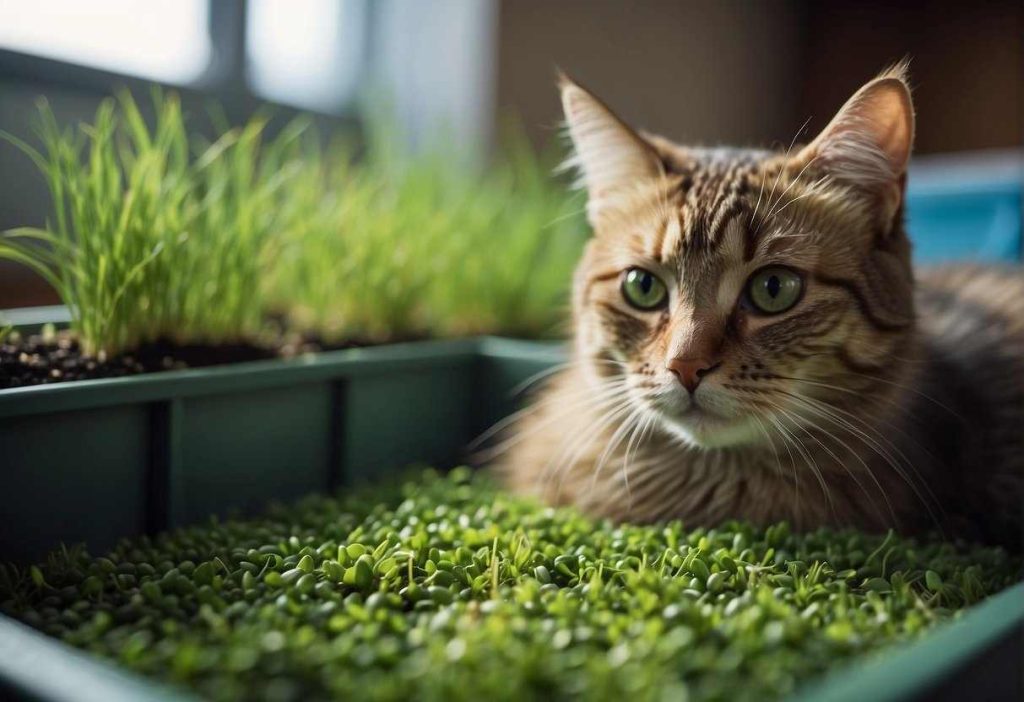
First off, here’s the scoop on odor control.
Nobody wants a smelly cat litter box, right? Well, grass seed litter has natural odor-controlling properties, making it a breath of fresh air for your home.
Regarding absorbency, this litter is no lightweight. It quickly soaks up moisture, preventing those pesky puddles that can lead to bad smells and a mess.
As for ease of use, you’ve got it made!
Grass seed litter is often lighter than many other types, which means you won’t be breaking your back carrying heavy bags. Plus, it’s usually dust-free, sparing you and your kitty from a sneezing fiesta.
Now, let’s talk clumps.
The clumping properties of grass seed cat litter are something to write home about. It forms tight, easy-to-scoop clumps, cutting down your cleaning time. Who wouldn’t want that?
Finally, the cleanup convenience: messes can be swiftly dealt with, leaving you with more time for those cozy cat cuddles.
- Quick absorbers
- Easy on the nose
- Lightweight for carrying
- Dust-free for health
- Tight clumping means simple scooping
- Cleanup? A breeze!
In a nutshell, if you’re eyeing a litter that’s kind to your feline and simple to maintain, grass seed litter could be your hero.
Remember, a happy cat and a clean house make for a purr-fect day!
Economic Aspects: Analyzing Cost-Effectiveness
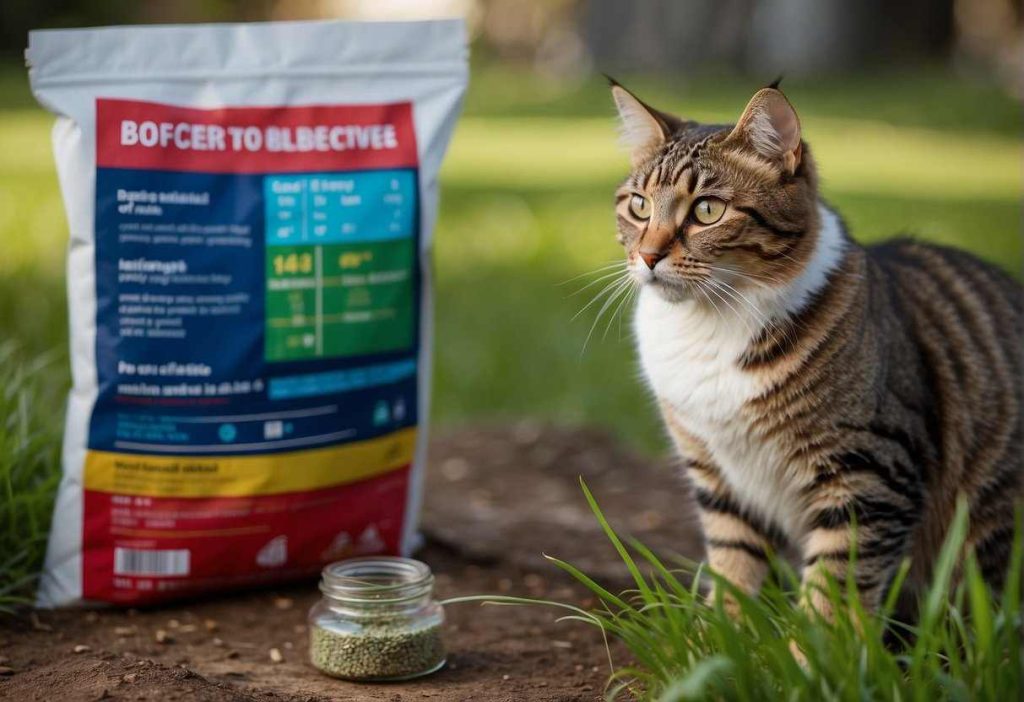
Long-term Value Proposition
- Grass Seed Litter: You’ll find that grass seed litter is often biodegradable and flushable. While it might be a tad pricier upfront—think in the ballpark of $1.50 to $2 per pound—the long haul cost savings might just surprise you.
- Clay Litter: The old-school option runs cheaper at about $0.50 to $1 per pound, but remember, with great cost comes great (dust) clouds.
- Other Eco-Friendly Litters: Alternatives like recycled paper or walnut-based products can run anywhere from $1 to $1.80 per pound.
Market Overview and Pricing Trends
Looking at the pet care aisle, you’ve probably noticed grass seed litter gaining shelf space.
This trendy kitty necessity is a testament to green consumer habits. Plus, its gentle-on-paws feature makes it a hit.
However, its ascending popularity means a slight uptick in prices—blame the laws of supply and demand.
Cost Factors for Grass Seed Litter
- Production: Not all grass is created equal. The type and quality influence cost.
- Packaging: Eco-conscious packagings, while better for Mother Earth, might add a few cents.
- Branding: Top-tier brands can command higher prices for perceived quality.
Tips for the Budget-Conscious Owner:
- Buy in bulk to reduce the cost per use.
- Keep an eye out for sales and discounts—hoard (responsibly) when prices dip.
- Compare shops and online deals to snag the best bargain.
Wouldn’t you say that going green with your cat’s business doesn’t have to mean spending more green?
You’ve got the insights to make a savvy decision that feels good for both the planet and your pocket!
Happy litter shopping!
Real User Experiences and Adaptation Tips
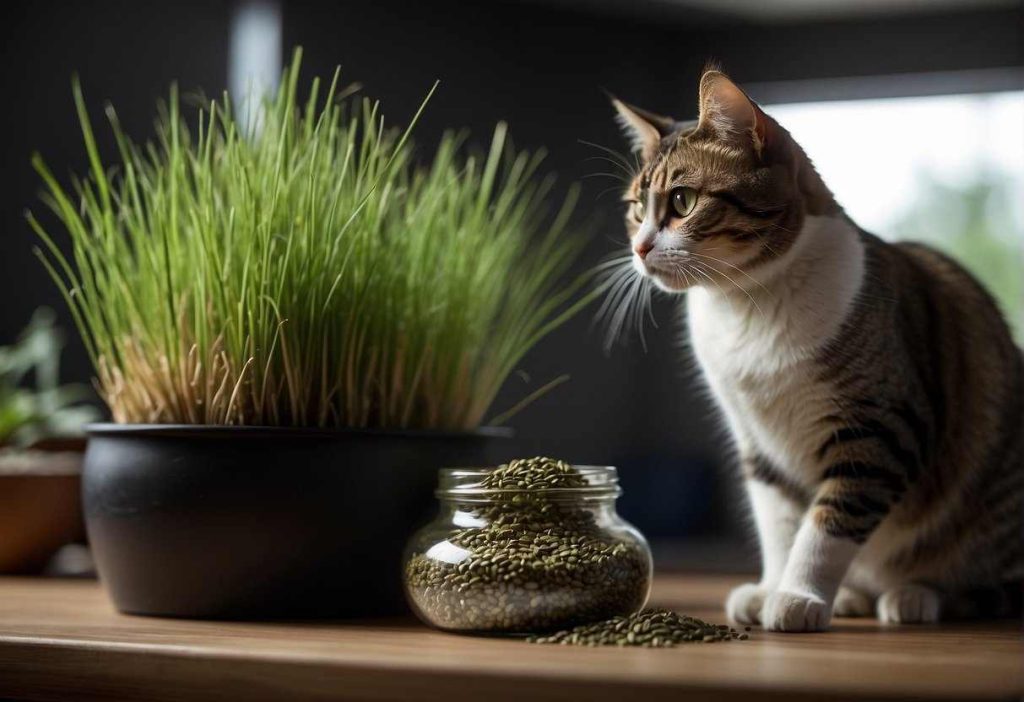
Testimonials from Cat Owners
Have you ever wondered how other cat owners feel about grass seed litter? Well, you’re not alone!
- “Love it: My cat took to it immediately, and there’s virtually no dust!” – Emily R.
- “A no-go: Sadly, my feline friend was less than impressed and stuck to the old litter.” – Dave P.
- “Satisfied: It clumps well and keeps odors at bay, a huge relief for my small apartment!” – Linda K.
Guidance for Transitioning to Grass Seed Litter
Switching to grass seed litter can feel like walking on a tightrope. Eager to give it a try?
- Step by Step: Begin by mixing the grass seed litter with your cat’s current litter, gradually increasing the ratio over the course of a week.
- Patience is Key: Observe your cat’s reaction. If they seem hesitant, slow down the transition pace.
- Location Matters: Place the litter box with grass seed litter in a familiar spot to encourage your cat to use it.
- Stay Consistent: Once fully switched, avoid changing the litter type again swiftly as cats prefer consistency.
Quick Recap
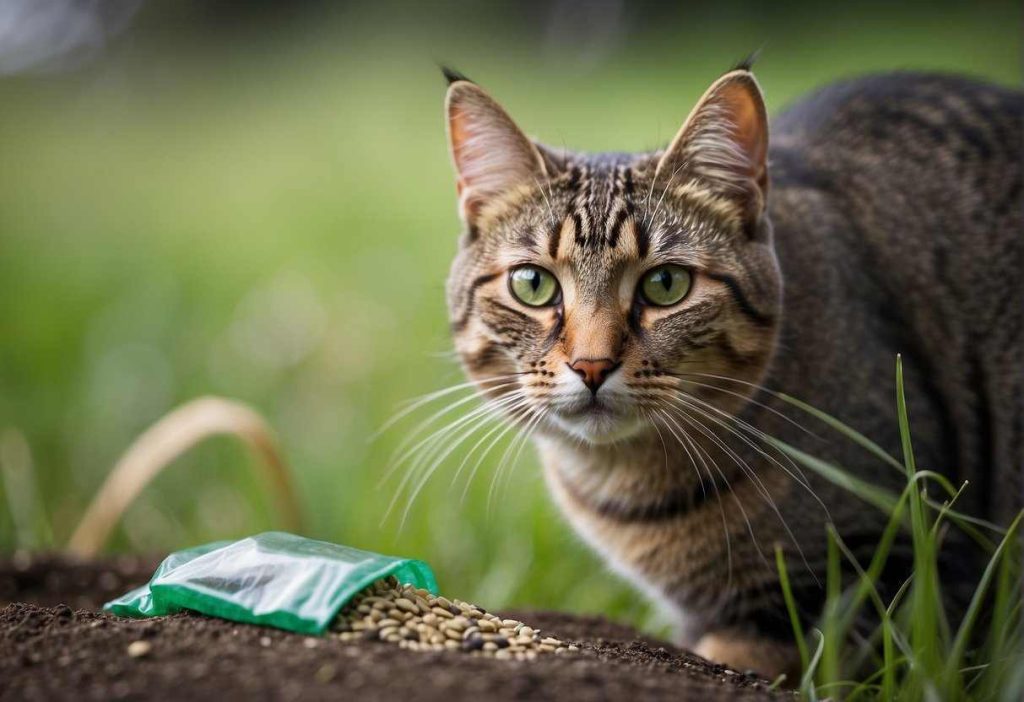
Safety:
- Non-toxic: Grass seed litters are generally made from natural, biodegradable materials, meaning they’re non-toxic to your purry pal.
- Dust-free: Most brands boast a dust-free experience. No sneezy kitties and cleaner air in your home!
Benefits:
- Eco-friendly: Made from renewable resources, grass seed litters break down easily without harming the environment.
- High absorbency: They’re champions at soaking up liquids, which means less mess and odor.
Recommendations:
Here’s what you need to remember when considering grass seed litter for your kitty:
- Monitor your cat: Always keep an eye out for any unusual behavior when changing litters.
- Trial period: Give it a test run! Cats can be picky, so it’s important to see if they take to the new litter comfortably.
- Cleanliness is key: Maintain a clean litter box. This goes for any litter type, really.
Want to make the switch?
Go ahead and sprinkle some grass seed litter into your cat’s life, but remember to introduce it gradually.
Your fluffy friend will thank you for the extra care!
Keep those paws clean and conscience green, folks!
Frequently Asked Questions
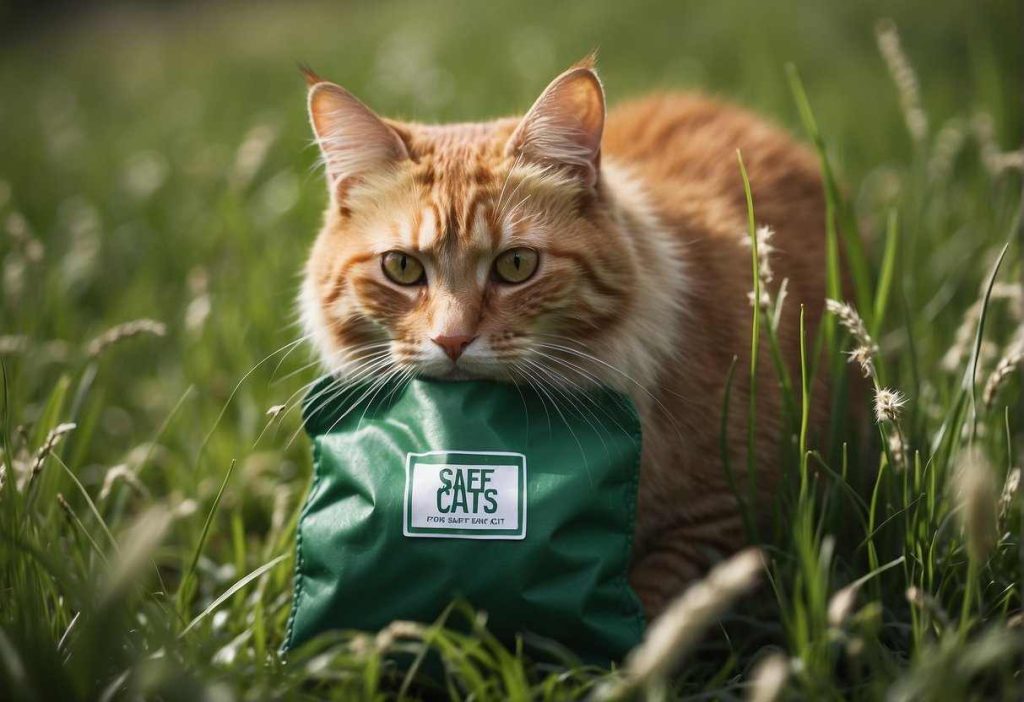
What are the key benefits of using grass seed litter for my feline friend?
Grass seed litter is gentle on your cat’s paws and can be an eco-friendly option.
It’s biodegradable and often contains no added chemicals, which is a plus for your kitty’s health and the environment.
Can grass seed litter cause allergies in cats or humans?
While grass seed litter is generally hypoallergenic, some cats or humans may have sensitivities to grass.
It’s rare, but if you notice sneezing or itching, it may be worth checking for an allergy.
How does grass seed litter compare to other natural alternatives in terms of dust production?
Grass seed litter typically produces less dust than clay litter.
Compared to other natural options, it’s comparable, but pine or wheat litters might produce a bit more dust due to their composition.
Is it possible to flush grass seed litter down the toilet without causing plumbing issues?
Grass seed litter is often advertised as flushable, but it’s best to avoid flushing any litter. Even small amounts can contribute to clogs or other plumbing issues over time.
Is grass seed litter safe if ingested by cats during grooming?
In small amounts, grass seed litter is generally safe if ingested. However, consuming litter isn’t ideal, so keep an eye on your cat’s grooming habits just to be safe.
What are the environmental impacts of disposing of grass seed cat litter compared to traditional litters?
Disposing of grass seed litter is generally more environmentally friendly than clay-based litter.
It’s biodegradable, meaning it’ll break down naturally without contributing to landfill volume.
What is the cost comparison of grass seed litter to other eco-friendly alternatives?
Grass seed litter may be costlier than traditional clay litters but is often competitively priced alongside other natural litters like corn, wheat, or walnut-based options.
It’s a worthwhile investment for its eco-friendly benefits.
- Free Online Casino Games: What You Need to Know - July 26, 2025
- Ideal Casinos Mobile: The Ultimate Guide to Mobile Betting - July 26, 2025
- The Ultimate Overview to Casino Site Gamings Online - July 26, 2025

